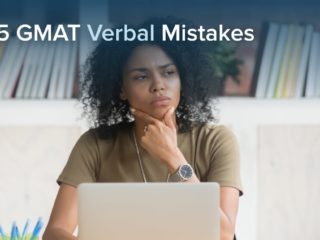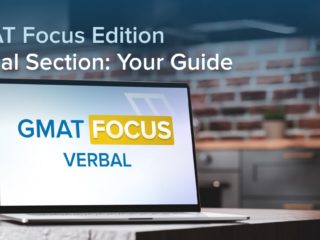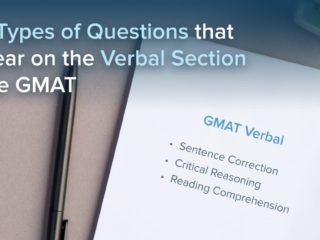Last Updated on November 23, 2023
If you’re a non-native English speaker planning to take the GMAT to apply to business school, you may be concerned that the fact that English is not your first language will make achieving your GMAT Verbal score goal difficult. However, non-native English speakers are not at as much of a disadvantage in GMAT Verbal as you may think. Furthermore, there are things you can do to master GMAT Verbal even if English is not your native language.
So, in this article, I’ll first discuss what the creators of the GMAT do to make the GMAT Verbal section as fair as possible for everyone. Then, I’ll provide GMAT Verbal tips that non-native English speakers can use to master the section and achieve their score goals.
Here’s what we’ll cover:
- How the GMAT Levels the Playing Field for Non-Native English Speakers
- What Should Non-Native Speakers Do to Prepare for the GMAT?
- Summary: GMAT Verbal for Non-Native English Speakers
- What’s Next?
Let’s begin by discussing what the GMAT does to be fair for non-native English speakers.
How the GMAT Levels the Playing Field for Non-Native English Speakers
The GMAT is written in formal English; it is not offered in any other languages. Accordingly, making the test an even playing field for native and non-native English speakers may seem like a big task. How exactly does GMAC, the maker of the GMAT, achieve this ambitious goal of fair play?
Lots of ways, actually. Let’s look at a few of the main ones.
No Speaking or Listening
The GMAT is a test of formal written English. That fact may sound unimportant, but written and spoken English are genuinely distinct languages. Each contains many basic grammar rules and constructions that do not, and cannot, even exist in the other!
The comma + -ing modifier is one basic element of formal written English that is completely absent from speech. Try saying a sentence like this one out loud: I dropped the bags onto the floor, scaring my dogs. It will be plain that you’re not really speaking English, but rather just reading a written sentence aloud.
So, virtually nobody is a “native speaker” of written English (except a very small population of deaf test-takers, who do in fact tend to do quite well on the GMAT Verbal section). Thus, the GMAT avoids a huge potential source of bias against foreign test-takers by testing only written English.
The GMAT avoids a huge potential source of bias against foreign test-takers by testing only written English.
Passages Say What They Mean
In casual real-world conversation, we often just imply points we think are obvious, trusting listeners to infer them. For instance, at 7:30 some Friday evening, we might yell to a friend: “Our dinner reservations are at eight! And the restaurant is 40 minutes away!” The actual point is, We’re going to be late—which we trust our friend to pick up, along with the pace!
In everyday speech, we omit points large and small alike. Exactly what can be omitted and when, though, vary considerably from one language to another. Consequently, omitting any conclusion from an argument unfairly advantages native speakers of the language used. Thus, one of GMAC’s most powerful weapons against linguistic bias is simply to state every point or conclusion explicitly in reading passages.
KEY FACT:
Conclusions in Critical Reasoning and main points in Reading Comprehension will be explicitly stated in the passage text.
The only exception to this practice is the Critical Reasoning problem type that gives you an argument’s supporting premises and asks you to identify the conclusion toward which the argument is headed. On those problems, the conclusion is indeed omitted—but only because you have to provide it!
No Obscure Vocabulary
If you’re a non-native English speaker, you may worry that a single word could ruin your chance of correctly answering a GMAT Verbal question. Maybe a question will depend on a word you don’t know or don’t remember. The GRE Verbal section does in fact depend rather heavily on advanced vocabulary. If you’ve done any significant studying for that test, you may be especially afraid of this scenario.
As far as the GMAT goes, though, you can rest easy here. In any given language, few things favor native speakers as much as advanced vocabulary. This bias is especially pronounced in English, which has far more words than any other language in the world. As a result, to ensure fairness, the GMAT refrains altogether from using unnecessarily obscure words.
KEY FACT:
Generally, GMAT questions will not require you to have knowledge of difficult vocabulary words.
It’s possible, but unlikely, that you’ll encounter a genuinely difficult word in an RC or CR passage. Even in these exceptional instances, you still won’t likely need to know obscure definitions.Difficult words will generally come with context clues that help you figure out what the words mean.
No Obscure Idiomatic Structures
In the past, arriving at the correct answers to some GMAT Sentence Correction questions required knowledge of obscure idiomatic structures, i.e., “GMAT idioms.” Of course, non-native English speakers are unlikely to know these structures, especially ones commonly used in the United States only.
So, to make the GMAT fair for everyone, the writers of SC questions no longer include obscure structures in the questions. They use only idiomatic structures that are commonly used in the English language.
KEY FACT:
To make the GMAT as fair as possible, in Sentence Correction, the test-makers use only idiomatic structures that non-native speakers would know.
Big Differences in Verb Tense
Spoken and written English, as discussed earlier, can be quite different from each other—except when it comes to verb tenses. Perhaps surprisingly, English speakers and writers of formal English choose the forms of verbs they use more or less identically.
This similarity is another potential source of linguistic bias on the GMAT. If Sentence Correction tested the subtleties of verb tenses, native speakers could simply rely on their “ear.” Non-native speakers would not have the same sense of what is correct.
To eliminate this potential bias, regarding verb tense, the GMAT tests only major differences. No GMAT problem will require you to base your choice on subtle differences in verb tense.
If that kind of decision seems necessary for answering a question, double-check for other, more fundamental issues in the same answer options. One of the options will probably make a much bigger mess, such as non-parallelism, elsewhere in the sentence.
The only verb-tense decisions that you may really and truly need to make will involve BIG differences: past versus future, present perfect versus past perfect, and so on.
KEY FACT:
To be fair for non-native English speakers, regarding in verb tense, the GMAT tests only major differences.
Grammar Rules That Trip Up Native Speakers
Because spoken and written English are so different at times, native English speakers can actually be at a disadvantage in some ways in GMAT Verbal.
For example, when native English speakers use the word “which,” they’re often describing the entire preceding clause, as in, My best friend crashed her car, which made her parents furious.
In formal written English, “which” cannot refer to an entire clause. The only thing “which” can refer to is the preceding noun (or noun phrase).
Similar differences between speech and writing exist in the use of conjunctions. If you’re a non-native speaker of English, these grammatical elements probably don’t stand out at all. Pronouns, conjunctions—these are just things you learn as you improve your English skills, right?
On the other hand, native speakers must shake off longstanding spoken-language instincts, which will mislead them in SC. Second-language English learners simply don’t have that problem. Thus, in certain ways, the playing field is tilted away from native speakers. GMAC’s question-writers have mastered this delicate balance of opposing biases to create a level playing field overall.
KEY FACT:
Because of differences between spoken and written English, non-native English speakers have at least one advantage over native speakers in GMAT Verbal.
Now that we understand how the GMAT Verbal section is made as fair as possible for everyone, let’s discuss how non-native English speakers can master GMAT Verbal.
What Should Non-Native Speakers Do to Prepare for the GMAT?
If you’re a non-native speaker of English, you needn’t hunt high and low for a specialized GMAT course. Nor will you need to seek out a special GMAT Verbal tutor for non-native English speakers. In fact, the primary course offerings from prep companies, including Target Test Prep, should be more than adequately suited to your needs. After all, GMAT prep courses teach Verbal by focusing on specific rules and concepts, thus fitting well with second-language learning.
That said, there are definitely things non-native English speakers can do to ensure they’re in an optimal position to score well on GMAT Verbal on test day.
Understand That, to a Large Degree, GMAT Verbal Is a Test of Reasoning Skill
The full name of the GMAT Verbal section is the “Verbal Reasoning” section. Accordingly, a key aspect of mastering GMAT Verbal is realizing that, to a large degree, it’s a test of reasoning skill. In fact, I’ve seen people without strong English language skills but with strong reasoning skills score very high on GMAT Verbal.
Yes, English skills and knowledge of rules of standard written English are necessary for scoring high on GMAT Verbal. At the same time, understanding that GMAT Verbal tests reasoning skill is empowering in multiple ways.
One way it’s empowering is that it makes clear that skills that everyone, including non-native English speakers, has or are in a position to develop are key in scoring high on GMAT Verbal. Also, if you’re strong in math, it may be helpful to know that the type of thinking required for solving GMAT Verbal questions is often very similar to the thinking we use in solving quant questions. So, by understanding that GMAT Verbal tests reasoning skill, you can become more confident that you can master it.
Another way understanding that GMAT Verbal tests reasoning skill is empowering is that it makes clear that, to prepare for GMAT Verbal effectively, we have to develop our reasoning skills. Being clear about this aspect of GMAT Verbal prep will help us get the results we want.
TTP PRO TIP:
To master GMAT Verbal, see it as largely a test of reasoning skill and prepare accordingly.
Read Far and Wide
Though GMAT Verbal is largely a test of reasoning skill, to master GMAT Verbal, you do need somewhat strong English reading skills. So, it may be that improving your English reading skills will be a necessary aspect of your GMAT preparation.
The only way to master the art of reading is lots and lots of reading, of roughly the same type and level of material as is on the GMAT exam.
GMAT reading passages are similar to full-length periodical or journal articles and typically cover topics of academic interest. Therefore, you’ll find lots of useful reading material in journals or in equivalent online collections of academic articles.
Always do your best to read articles in the same way you’ll read GMAT passages. Seek to identify main ideas and passage-wide themes. Remember, you’ll always be able to refer back to the passage text. Don’t get distracted by the time-wasting habit of memorizing specific details as you read.
TTP PRO TIP:
If you need to improve your English reading skills, read articles from journals and other publications in the same way you’ll read GMAT passages.
Look Up Words You Don’t Know
As we have discussed, the GMAT tends not to use obscure vocabulary. However, there are certain words that the GMAT often uses whose definitions you may not be sure of, such as “advocate,” “bolster,” and “presume.” So, when you see a word you don’t know during your GMAT preparation, you can look it up and add it and its definition to a document or flashcard that you review periodically. Also, you can use newly learned words in your English speaking and writing to cement your memory of their meanings.
TTP PRO TIP:
To improve your GMAT-related vocabulary, look up unfamiliar words you see during your preparation.
Learn a Reliable Strategy for Answering Each Verbal Question Type
It’s amazing how much difference a reliable strategy can make in your ability to correctly answer a GMAT Verbal question. For instance, the “Yes/No test” for Evaluate the Argument questions can save you time and help you answer Evaluate questions correctly (the TTP course covers this strategy in detail). So, a key move anyone can make to master GMAT Verbal is to learn a reliable strategy for answering each type of question.
For Sentence Correction, what constitutes the best strategy is perhaps not clear cut and can vary from question to question. However, there are some SC approaches, such as eliminating easy-outs first, that can be helpful. Meanwhile, for Critical Reasoning and Reading Comprehension, there are clear strategies such that, by learning them, you can make quick and noticeable improvements in performance.
TTP PRO TIP:
To master GMAT Verbal, learn a strategy for answering each type of Verbal question.
See Sentence Correction as a Test of Skill in Noticing Issues
Coming to Sentence Correction as a non-native English speaker who has studied English grammar, you can easily get the impression that SC is a grammar test. However, the truth is that, while grammar knowledge is necessary for SC, it’s not simply a grammar test. SC is a test of skill in noticing issues in construction and meaning.
So, to master SC, you have to focus on developing the necessary skills. In other words, you won’t learn SC by simply learning every grammar rule involved in Sentence Correction questions. You have to learn to effectively apply grammar rules, notice what is going on in sentences, and articulate why what’s going on is incorrect or correct.
TTP PRO TIP:
To master Sentence Correction, focus on learning to apply grammar rules, notice what is going on in sentences, and articulate why what’s going on is incorrect or correct.
Focus on Improving Execution
Perhaps the most important thing anyone preparing for the GMAT, including non-native English speakers, can do is focus on improving execution. In other words, to master GMAT Verbal, focus on learning to do whatever it takes to arrive at correct answers.
Improving execution includes learning not only to apply strategies but also not to make careless mistakes. Many non-native English speakers who initially blame their English skills for trouble they’re having with GMAT Verbal discover that, by learning not to make careless mistakes, they can achieve their GMAT score goals.
Improving execution can also mean learning to figure out the meaning of an unknown word by considering context, or learning to get a question correct even though you have no idea what a word means. Similarly, you can learn to get Sentence Correction questions correct by finding ways to make correct decisions even if you’re not completely clear about some aspects of the sentence versions in a question.
In general, a major aspect of mastering GMAT Verbal is simply learning to get things done. An executive succeeds in business by seeing things that aren’t obvious, paying attention to both the big picture and details, and handling challenges that arise. We can succeed in GMAT Verbal in a similar way.
TTP PRO TIP:
To master GMAT Verbal, focus on improving your execution when answering questions.
Let’s now wrap up by reviewing the tips we have discussed.
Summary: GMAT Verbal for Non-Native English Speakers
Here are our tips that non-native speakers can use to master the Verbal section of the GMAT:
- Understand that GMAT Verbal is largely a test of reasoning skill and prepare accordingly.
- Read far and wide to improve your English reading skills.
- Learn unfamiliar words you see during your preparation to improve your GMAT-related vocabulary.
- Learn a reliable strategy for answering each type of GMAT Verbal question.
- See Sentence Correction as a test of skill in noticing issues.
- Focus on execution to increase your accuracy and achieve your score goal.
What’s Next?
Now that you have a better understanding of how non-native English speakers can master GMAT Verbal, you can check out this article on the best GMAT practice methods to learn how to maximize the results you get from your GMAT practice.



